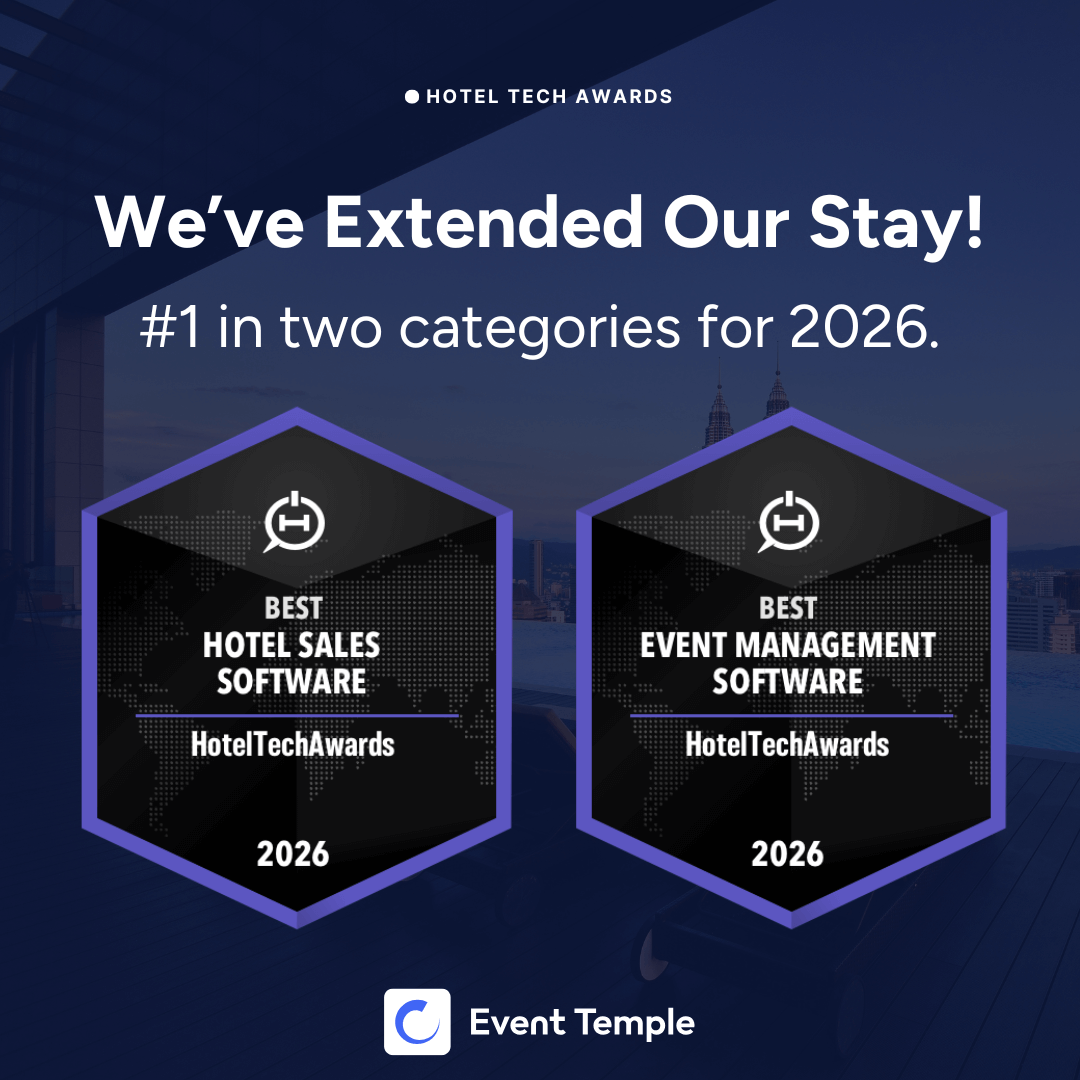
This is the sixth blog in our series on How to Improve Your Hotel’s Sales. To be the first to get Part 7 sign up here
The race to the bottom on pricing is a dangerous game for hotels with event spaces. When you lead with discounts, you're not just cutting into your profit margins, you're training clients to see your venue as a commodity rather than a unique experience. It's time to shift the conversation from "how much?" to "what's possible?"
The Hidden Cost of Discount Culture
Every time you offer a discount to close a deal, you send a powerful message to the market: your stated rates aren't real. When implemented strategically, discount pricing can help drive revenue, boost profitability and reach new segments. All while building loyalty and increasing occupancy year-round. However, it's important not to over-rely on this strategy because it may eat into profitability or threaten your brand image by undermining its perceived value. (Hotel discount pricing strategy)
Think about it—if your sales team's first instinct is to offer 20% off to close a deal, what does that tell clients about your confidence in your value proposition? More importantly, what happens when competitors match your discount? You're back to square one, but with lower margins.
Building a Compelling Value Proposition
You can set your room rates higher than the local competition while also offering more extras in the basic package. This gives the illusion that the hotel offers a premium experience that focuses on value rather than just low rates. (Hotel pricing guide - SiteMinder) But this isn't about creating an illusion—it's about genuinely delivering more value.
Start by identifying what makes your property irreplaceable:
1. Experience Architecture
Don't just sell meeting rooms—sell outcomes. What can happen at your property that can't happen anywhere else? Perhaps it's your:
- Unique architectural features that create memorable photo opportunities
- Specialized event technology that enhances presentations
- Expert event team that turns visions into reality
- Exclusive partnerships with local vendors or attractions
2. Service Differentiation
Your UVP needs to be rooted in what makes your brand truly special. These unique selling points can range from an excellent location and superior amenities to unparalleled customer service or sustainable practices that appeal particularly to eco-conscious travelers. (Hotel Positioning Strategy)
Consider creating signature services that competitors can't easily replicate:
- Dedicated event success managers who act as strategic partners
- Customized wellness breaks designed by your spa team
- Farm-to-table catering with a story behind every ingredient
- Technology concierge services for hybrid events
3. Strategic Positioning
The market accepts and understands your positioning: among the cheapest in the market. That can work if that positioning does not drive the market rates down. Is there an opportunity to still sell more expensive on specific periods? How does your client value your hotel? (Hotel Price Positioning Strategy)
Instead of positioning as the cheapest, position as the smartest choice for specific outcomes.
Mastering the Art of Discovery
The secret to selling value lies in understanding what your clients truly value—and you can't do that without asking the right questions. Every question and answer have to move the needle to: Create fit (and qualify out where that doesn't exist) Demonstrate compelling value (the type of value that makes deals happen)
Strategic Discovery Questions for Hotel Event Sales
Understanding Their Vision:
- "Walk me through what a wildly successful event looks like for your organization."
- "What would your attendees say if this was the best event they'd ever attended?"
- What is the value of making this change — solving this problem or exploiting this opportunity? What changes or happens as a result? (Sales Discovery Guide)
Uncovering True Priorities:
- "Beyond the agenda, what are you really trying to accomplish with this gathering?"
- "What keeps you up at night when planning events like this?"
- "If you could wave a magic wand and fix one thing about your current event experience, what would it be?"
Exploring Past Experiences:
- What solutions have you tried in the past? How did that work out? What was missing? (Sales Discovery Questions Guide)
- "Tell me about the best venue experience you've ever had. What made it exceptional?"
- "What's one thing you wish your current venue understood better about your needs?"
Qualifying Budget Conversations: Rather than asking "What's your budget?"—which immediately shifts focus to price—try:
- "What goals or outcomes are you hoping to achieve with a solution like ours?" (Mixmax Sales Discovery Guide)
- "How do you typically measure the ROI of your events?"
- "What would it mean to your organization if this event exceeded all expectations?"
The Power of Collaborative Discovery
The key to qualifying questions in the sales discovery process is to listen actively and encourage more sharing. (Sales Discovery Questions - Highspot) This isn't an interrogation—it's a consultation. Your role is to be a strategic advisor, not just an order taker.
Best practices for discovery conversations:
- Lead with curiosity: Approach each conversation as if you're learning about their business for the first time
- Go deeper: When they mention a challenge, ask "Tell me more about that" or "How is that impacting your team?"
- Connect the dots: Link their challenges to specific solutions your property offers
- Confirm understanding: "So if I'm hearing correctly, your main priority is..."
Creating Value-Based Proposals
Once you understand what truly matters to your client, you can craft proposals that speak to value, not price.
Structure Your Proposals Around Outcomes
Instead of leading with room rates and catering menus, structure your proposals around their stated goals:
Traditional Approach:
- 50 guest rooms at $XXX/night
- Meeting space rental: $XXXX
- Catering: $XX per person
Value-Based Approach:
- "Achieving Your Goal of 95% Attendee Satisfaction"
- Curated arrival experience including...
- Dedicated success team ensuring...
- Technology package enabling...
- Investment: $XXXXX
Quantify the Value
Help clients see the return on choosing your property:
- Time saved through dedicated coordination
- Risk mitigation through experienced event management
- Enhanced attendee satisfaction leading to better business outcomes
- Cost avoidance (what could go wrong elsewhere)
Handling Price Objections Without Discounting
When clients push back on price, resist the urge to immediately offer a discount. Instead:
1. Acknowledge and Explore
"I understand price is an important consideration. Help me understand—is it that the overall investment doesn't align with your budget, or are there specific elements that seem out of line with the value?"
2. Reinforce Value
Don't be lazy; get creative with your incentives and lead with value, not price. You'll improve your margins, strengthen your brand, and best competitors…all without slashing your prices. (Why Discounting Is Bad For Your Brand)
Remind them of the unique value you're providing:
- "Remember, this includes our dedicated event success manager who typically saves planners 10-15 hours..."
- "Our technology package alone would cost $X if sourced separately..."
3. Offer Value-Added Alternatives
Instead of discounting, consider:
- Complimentary room upgrades for VIP attendees
- Extended access to event spaces for setup/breakdown
- Additional services at no extra charge
- Future event credits
- Exclusive access to new amenities
4. Create Urgency Without Discounting
- "If you confirm by [date], I can guarantee our new renovation will be complete for your event"
- "Booking now secures our A-team of event professionals who are in high demand"
Building Long-Term Value Relationships
The goal isn't just to avoid discounting on one event—it's to build relationships where price becomes secondary to value.
Become a Strategic Partner
When you develop the business acumen to adequately understand how the business objectives, business issues, problems and value connect with your unique solution, you're ready to sell to decision-makers. (How Salespeople Can Ask the Right Questions)
Position yourself as an extension of their team:
- Provide insights about event trends in their industry
- Share case studies of similar successful events
- Offer to connect them with past clients in similar industries
- Suggest innovative approaches based on your experience
Measure and Communicate Success
After each event:
- Conduct thorough debriefs
- Quantify the success metrics that matter to them
- Document unique value delivered
- Build a case study for future conversations
The Path Forward
Instead, look at your competitors' rates and add value to increase midweek bookings. Create and promote special packages which offer additional services. (Hotel Pricing Strategy Guide) But don't just add services—add meaningful value that aligns with client goals.
Transitioning from a discount-driven sales culture to a value-based approach takes time and commitment. Start with these steps:
- Audit your current value proposition—what do you offer that no one else can?
- Train your sales team on consultative selling and strategic discovery
- Develop value-based proposal templates that highlight outcomes over features
- Create case studies that demonstrate quantifiable value delivered
- Monitor and celebrate value-based wins to reinforce the new approach
Remember, when you compete on price alone, the only winner is the client's procurement department. When you compete on value, everyone wins—your clients achieve their goals, their attendees have memorable experiences, and your property maintains healthy margins while building a reputation for excellence.
The choice is yours: continue the race to the bottom, or elevate the conversation to focus on what really matters—creating exceptional events that drive real business results. Your clients aren't just looking for the cheapest venue; they're looking for a partner who understands their vision and has the expertise to bring it to life.
Start asking better questions. Start delivering more value. Start saying no to the discount game.



